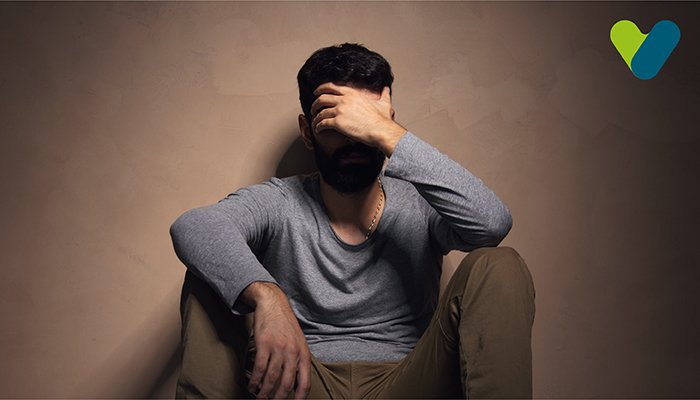Kritika recently lost her husband in an accident 4 months back. She and her husband have known each other for a decade. When her husband passed away, Kritika started isolating herself in a room and was not even eating on time, nor did she socialize—seeing all this, her sister felt helpless. She suggested she meet a doctor and get over this. The doctor being an expert, told them they were significant depressive disorder symptoms. He suggested some medicines and exercises and told her various ways to recover from the depression. After 3 months of complete diagnosis, she became normal again.
What is Depression?
Depression, commonly termed major depressive disorder, is an emotional illness that regularly causes you to feel unhappy or uninterested in life. If one doesn't receive help for their depression, it might worsen and linger for months, if not years. It may be painful and even lead to suicide, just as it is for around one out of every ten who suffers from depression. These sentiments, however, might prevent you from leading a regular, productive life if they become overwhelming, induce physical symptoms, and linger for a long time.Symptoms
There are many symptoms of depression, but you might also not experience all of them. Individuals vary in terms of how severe they have been and how long they last.They may include the following:
- Hopelessness and pessimism
- Digestive issues which do not improve despite therapy
- Overeating or a lack of appetite
- Irritability or grumpiness
- Losing interest in formerly pleasant activities, which include sex
- Sleeplessness, early-morning restlessness, or napping too much are all symptoms of poor sleep.
- Attempting suicide or suicidal thoughts
- Aches, pains, headache, or cramping that are persistent
- Fatigue
- Tiredness
- Sadness, anxiety, or "hollow" sensations that persist
- Concentration, recalling facts, and making judgments are all difficult for you.
- Guilt, unworthiness, and powerlessness are all common feelings.
Diagnosis
Because there is no "depression test" that a doctor may perform to determine if you have it, determining if you have it frequently begins with a comprehensive history and physical examination. The doctors will ask these common questions.- When did your symptoms begin?
- How long have they lasted?
- What is their severity?
- If you have a family history of depression or other mental diseases
Treatment
- If your doctor confirms that your sign of depression is not due to a medical reason, they may begin treatment or send you to a mental health specialist.
- This expert will determine the best line of action. Medicines (such as antidepressants) or psychotherapy (a form of treatment) may be used, or both.
- Be aware that the procedure will take some time. You may need to attempt a few different therapies. It might take up to a month for medications to have full effect.
Are There Warning Signs of Suicide With Depression?
Suicide is a common occurrence among people suffering from depression. Suicidal ideas or plans are dangerous. The following are some of the warning signs:- A quick change in mood from grief to great tranquillity, or the appearance of happiness
- Taking dangerous risks, such as driving past a red signal, might result in death.
- Suicide is brought up in conversation.
- Constantly bringing up the subject of death or thinking about it
- Using phrases like "hopeless," "helpless," or "worthless."
- Paying a visit or making a phone call to close friends and family
- Clinical depression (sadness, loss of interest, sleeping and eating difficulties) that worsens
- Getting everything in order, such as tying up loose ends or updating a will
When Should I Seek Help?
You should seek professional help because:- It's critical to realize that just because you're depressed doesn't imply you're depressed. Not only does this disease affect mood, but it also affects sleep, energy, appetite, focus, and motivation.
- Get assistance immediately if you or somebody you know is suffering suicidal thoughts or emotions.
- Consult your doctor if you're experiencing physical symptoms like these and feel sad for days or weeks.
Forms of Depression
Depression is classified into many categories based on the symptoms and causes. Often, there is no clear explanation for these events. They can stay far longer in some persons than many others for no apparent reason.- Bipolar Depression (Manic Depression)
- Chronic Depression (Dysthymia)
- Atypical Depression
- Major Depression
- Treatment-Resistant Depression
- Psychotic Depression
- Seasonal Depression (SAD)
- Postpartum Depression
Are There Other Therapies for Treating Symptoms of Depression?
- TMS, or transcranial magnetic stimulation, involves inducing a magnetic field with a noninvasive device held above the head. It works by focusing on a particular brain area that might cause depression.
- A pacemaker-like device is surgically inserted beneath the collarbone to give regular impulses to the brain via vagus nerve stimulation, or VMS.
- Other therapies that your doctor may explore are listed below. ECT, or electroconvulsive therapy, is a therapeutic option for patients whose symptoms do not improve with medication or who have severe depression and require immediate treatment.


